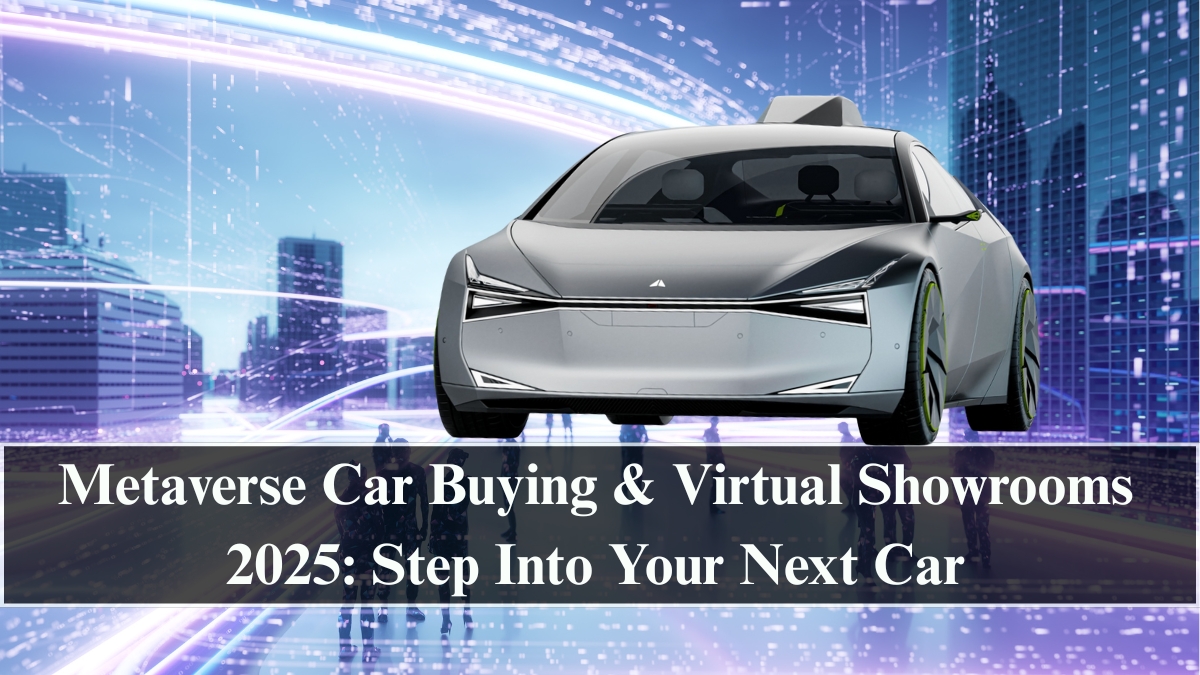In 2025, the car buying experience has gone fully digital — and deeply immersive. Gone are the days of walking through crowded dealerships or flipping through glossy brochures. Thanks to metaverse car buying and virtual showrooms, customers can now explore, customize, and even test-drive vehicles from their homes using VR, AR, and 3D digital twins.
The automotive retail industry is undergoing a paradigm shift where virtual reality meets commerce. Automakers are leveraging the metaverse to create engaging, interactive environments that blend physical experience with digital convenience — letting customers literally step inside their next car before purchase.

The Rise of the Metaverse in Automotive Retail
The metaverse — a collective digital universe powered by VR and AR — has become the next frontier for automotive sales and branding. With consumers increasingly preferring online experiences, automakers are integrating virtual showrooms and 3D configurators into their sales strategies.
In 2025, these experiences are hyper-realistic, using real-world vehicle physics, lighting, and spatial sound to replicate dealership experiences online. Customers can:
-
Walk around a full-scale 3D car model.
-
Customize trims, wheels, colors, and interiors in real time.
-
Explore vehicle features interactively.
-
Chat with AI-driven virtual sales assistants.
-
Complete financing or purchase digitally within the same environment.
This evolution merges e-commerce with experiential engagement, creating an entirely new way to shop for mobility.
How Virtual Showrooms Work
Virtual showrooms are built on 3D rendering engines and cloud platforms that stream high-quality models of vehicles directly to VR headsets, desktops, or mobile devices. The system uses digital twins — virtual replicas of real vehicles — to ensure accuracy in dimensions, colors, and behavior.
Key technologies include:
-
Web3 & Blockchain: To secure digital transactions and ownership records.
-
VR & AR Engines: Enable interactive exploration and customization.
-
Digital Twins: Provide life-like 3D models of cars and interiors.
-
AI-Powered Sales Bots: Guide customers, answer questions, and suggest configurations.
-
Cloud Integration: Ensures seamless streaming of 3D content across devices.
Customers can virtually “sit” in the driver’s seat, feel the proportions, test digital displays, and even start the engine in immersive environments.
Leading Automakers in the Metaverse Revolution
In 2025, every major automaker has established a presence in the metaverse retail ecosystem:
-
BMW’s Joytopia: Offers a fully interactive VR showroom with digital avatars and 3D car configurators.
-
Hyundai Mobility Adventure (Roblox): Allows users to explore and drive Hyundai models in a gamified world.
-
Mercedes-Benz Virtual Experience Hub: Combines AR shopping with voice-guided AI product tours.
-
Nissan’s Hyperverse Showroom: Showcases concept cars and user-customizable experiences.
-
Tesla’s MetaMall Presence: Enables customers to book test drives or make purchases through VR environments.
These immersive platforms are redefining brand engagement, turning car shopping into an emotional, high-tech journey.
Benefits of Metaverse Car Buying
The shift to metaverse-driven automotive retail offers major advantages for both consumers and manufacturers:
-
24/7 Accessibility: Customers can explore cars anytime, anywhere.
-
Enhanced Engagement: Immersive, gamified experiences build stronger emotional connections.
-
Personalization: Real-time customization of features, colors, and accessories.
-
Lower Costs: Reduces the need for physical dealerships and inventory overhead.
-
Data Insights: AI analyzes user preferences for targeted recommendations.
-
Sustainability: Cuts physical display models, travel, and resource waste.
For automakers, this new approach also strengthens global reach, allowing brands to connect directly with buyers in regions without dealership networks.
Challenges of Virtual Automotive Retail
Despite its promise, the metaverse-driven retail model comes with challenges that must be addressed:
-
Hardware Accessibility: High-quality VR headsets are still not universal.
-
Data Security: Transactions in Web3 environments require strong encryption.
-
Regulatory Oversight: Digital vehicle sales need updated consumer protection laws.
-
User Trust: Some customers still prefer in-person interaction before large purchases.
-
Integration Complexity: Synchronizing online and offline sales systems requires robust cloud infrastructure.
To overcome these barriers, automakers are focusing on hybrid retail models, combining digital experiences with physical test drives and post-sale service hubs.
The Future of Metaverse Automotive Retail
By 2030, automotive retail will become a fully immersive digital ecosystem, where the metaverse serves as the central hub for discovery, interaction, and purchase. Cars will have their own NFT digital twins, enabling owners to showcase, resell, or even drive their cars virtually in simulation environments.
Emerging trends shaping the future include:
-
AI-guided purchase journeys with emotional recognition.
-
Haptic feedback integration for tactile realism.
-
Cross-brand virtual malls hosting multiple automakers in one digital arena.
-
Digital ownership NFTs tied to blockchain vehicle records.
-
Virtual reality test drives with realistic handling and sound physics.
The convergence of metaverse technology and mobility retail is not just about selling cars — it’s about creating experiences that redefine the joy of car ownership in the digital era.
FAQs
What is metaverse car buying?
It’s a digital car purchasing experience using virtual and augmented reality, where customers can explore, customize, and buy vehicles in immersive 3D environments.
How do virtual showrooms work?
They use 3D rendering, digital twins, and cloud streaming to allow customers to interact with life-like virtual versions of cars from any device.
Which car companies use metaverse technology?
BMW, Mercedes-Benz, Hyundai, Nissan, and Tesla are leading in building metaverse retail platforms.
What are the benefits of metaverse car shopping?
It offers 24/7 access, real-time customization, cost savings, and an engaging, immersive buying experience.
What’s the future of car buying in the metaverse?
By 2030, digital showrooms will integrate with blockchain, NFTs, and AI personalization to deliver seamless, fully virtual car ownership journeys.
Click here to know more.
